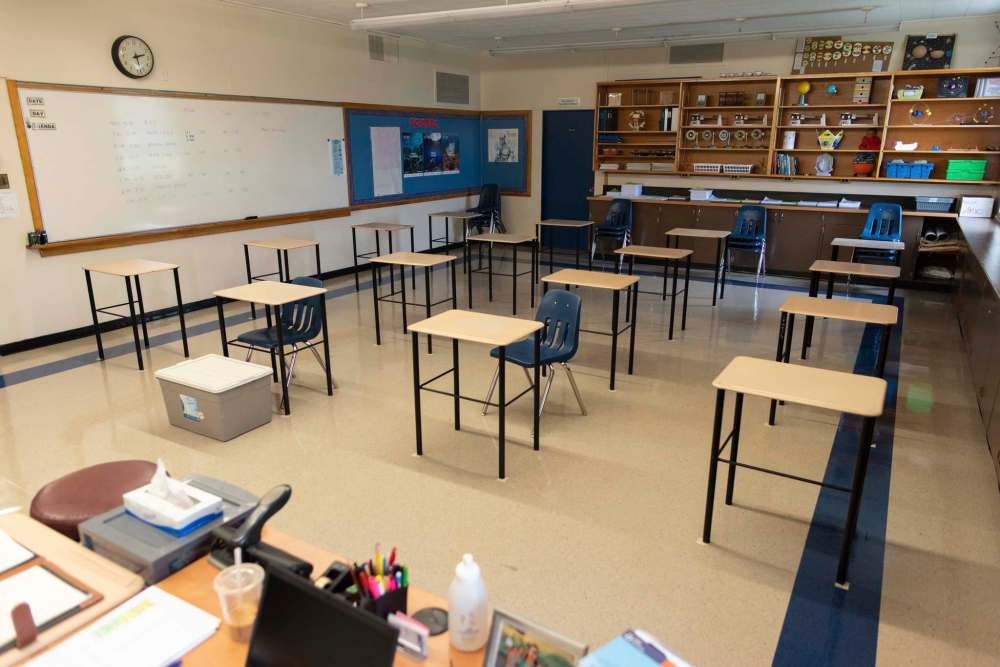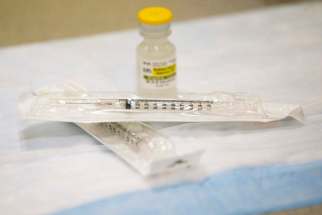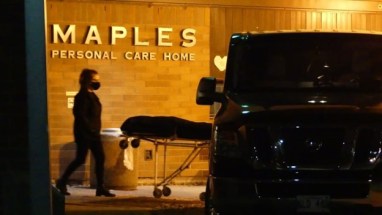Province seeks to vaccinate all Manitobans by end of August
Read this article for free:
or
Already have an account? Log in here »
To continue reading, please subscribe:
Monthly Digital Subscription
$0 for the first 4 weeks*
- Enjoy unlimited reading on winnipegfreepress.com
- Read the E-Edition, our digital replica newspaper
- Access News Break, our award-winning app
- Play interactive puzzles
*No charge for 4 weeks then price increases to the regular rate of $19.00 plus GST every four weeks. Offer available to new and qualified returning subscribers only. Cancel any time.
Monthly Digital Subscription
$4.75/week*
- Enjoy unlimited reading on winnipegfreepress.com
- Read the E-Edition, our digital replica newspaper
- Access News Break, our award-winning app
- Play interactive puzzles
*Billed as $19 plus GST every four weeks. Cancel any time.
To continue reading, please subscribe:
Add Free Press access to your Brandon Sun subscription for only an additional
$1 for the first 4 weeks*
*Your next subscription payment will increase by $1.00 and you will be charged $16.99 plus GST for four weeks. After four weeks, your payment will increase to $23.99 plus GST every four weeks.
Read unlimited articles for free today:
or
Already have an account? Log in here »
Hey there, time traveller!
This article was published 27/01/2021 (1782 days ago), so information in it may no longer be current.
Pandemic-weary Manitobans got a shot of hope Wednesday, as public health officials revealed plans to get COVID-19 vaccines into the arms of the general public, beginning with the most vulnerable seniors.
Based on current vaccine delivery projections, the province intends to start immunizing seniors 95 years of age or older — a population of about 5,000 people — in March, and will open up appointments in one-year age increments until everyone over 80 has had the chance to get a shot.
“Manitobans can expect that we will start with the very elderly and we will progressively, as supply comes in, we will continue to book those appointments as quickly as the supply is available,” Dr. Joss Reimer, medical lead for the province’s vaccine implementation task force, said at a news conference Wednesday afternoon.
The campaign to immunize the public will be based on age cohorts and will happen concurrently with three other groups the province has prioritized: health-care workers and congregate living staff, congregate living residents and First Nations.
With a high volume of deliveries from the federal government, including 700,000 doses of yet-to-be approved vaccine candidates, public health officials say Manitobans over the age of 18 could be fully immunized by Aug. 31 (assuming 70 per cent uptake) in four stages.
Members of the public will be cohorted by age (in 10-year increments) and, in the high-supply scenario, it’s expected people under 60 years of age could begin booking appointments in April.
“Manitobans can expect that we will start with the very elderly and we will progressively, as supply comes in, we will continue to book those appointments as quickly as the supply is available”
— Dr. Joss Reimer, medical lead for the province’s vaccine implementation task force
It will take the province between eight and 13 weeks to fully immunize each age cohort.
Under a reduced delivery schedule, the timeline to reach all eligible Manitobans would be extended to the end of December.
"I know everyone, obviously, is anxious to know where they fall on the priority list. Much depends of course on the vaccine supply from the federal government," Health Minister Heather Stefanson said.
"We also know that there will be questions on the priority list, but please know that experts in health care are the people that compiled the list based on research and science in consultation with their counterparts across the country."

!function(e,i,n,s){var t=”InfogramEmbeds”,d=e.getElementsByTagName(“script”)[0];if(window[t]&&window[t].initialized)window[t].process&&window[t].process();else if(!e.getElementById(n)){var o=e.createElement(“script”);o.async=1,o.id=n,o.src=”https://e.infogram.com/js/dist/embed-loader-min.js”,d.parentNode.insertBefore(o,d)}}(document,0,”infogram-async”);
Reimer said the province has nearly completed the first stage of immunizing select health-care workers and people in personal care homes, though delays in receiving Pfizer-BioNTech vaccine may slow progress in the short term.
In Stage 2, set to begin in April, health-care workers who provide patient care at hospitals, paramedics, and home care; health-care workers over age 60 providing patient care in community clinics and outpatient facilities; all staff in long-term care homes; and all staff over 60 in congregate care settings who aren’t involved in patient care will be prioritized.
Meanwhile, Reimer said immunization teams will start visiting high-priority congregate living facilities (including long-stay hospital patients, those in assisted living facilities and supportive housing) on Feb. 1.
Provincial jails, homeless shelters, transitional housing facilities and migrant workers who live in congregate settings will also be visited by immunization teams in Stage 2.
People who live outside of congregate settings with pre-existing health conditions that may make them more susceptible to severe outcomes of COVID-19 will not have their own priority group, Reimer explained.
“We have looked at a number of different research studies throughout the world and found that age is actually the best predictor of severe outcomes overall and tends to include the majority of folks who have multiple significant health conditions,” she said.
“I know everyone, obviously, is anxious to know where they fall on the priority list. Much depends of course on the vaccine supply from the federal government.”
— Health Minister Heather Stefanson
A fourth priority group of “essential workers” may be added to the campaign if other vaccine candidates are approved for use in Canada or supply increases, Reimer said.
Other provinces have identified teachers, first responders, and people working in food processing as essential workers.
“We want to take some time to do some stakeholder consultation to review the epidemiology, to talk to our occupational health and safety experts — so that is something that we’re still looking at and we want to make sure we do it right," Reimer said.
“We haven’t made any final decisions about essential workers."
Shot of disappointment

Posted:
Manitoba Teachers’ Society president James Bedford said the omission of education staff from the province’s COVID-19 vaccine priority groups is a slap in the face to teachers.
The consultation with stakeholders could take between one and two months to complete.
Manitoba NDP health critic Uzoma Asagwara said releasing the vaccine prioritization plan "was a really good step" the province should have taken sooner.
"This government continues to provide information and details that are critical to community members being able to make good, informed decisions about their health-care needs later than other jurisdictions," Asagwara said.
Wednesday’s announcement, however, left out some people in key roles and some key details, the MLA for Union Station said.
"We would like to see essential caregivers, for example, be able to access the vaccine, as we know that those folks are going into personal care homes to provide essential care," Asagwara said.
The plan has two "huge omissions," according to Liberal Leader Dougald Lamont: Métis and First Nations people, as well as "medically fragile" Manitobans.
"There are a whole bunch of people who are adults — some might be people with diabetes, people with mental or physical or developmental disabilities who need to be made a priority on this list," Lamont said.
"The list has been based largely on where people work and age, but there are people in their 40s and 50s who are just as vulnerable as people in their 70s and 80s. They need to be made a priority, as well."
The province said it will be making a joint announcement Monday with First Nations leadership on the rollout of the vaccine campaign.
— with files Carol Sanders
danielle.dasilva@freepress.mb.ca
wfppdf:https://wfpquantum.s3.amazonaws.com/pdf/2021/21616_DECK_Vaccination Tech Briefing 27Jan2021.pdf|Vaccination task force update:wfppdfInfrastructure behind vaccine rollout
Eligible people in rural Manitoba will be able to book appointments for COVID-19 vaccination at large-scale clinics in the Interlake-Eastern and Southern Health regions this spring.
The province announced Wednesday it will open a new “super site” clinic in each of the two health regions March 1, in anticipation of increased vaccine deliveries from the federal government.
Speaking on background, a member of the COVID-19 vaccine implementation task force said the locations for the two clinics have yet to be determined, but work is underway with local health authorities and communities.
The Winnipeg super site will also be prepared to increase its capacity “considerably” for March 1.
Once the province moves into Stage 3 of its vaccination campaign, more such large-scale clinics will open in each health region between April and July, in advance of dose deliveries from Ottawa.
The medical lead of the task force, Dr. Joss Reimer, said the province will be connecting with interested pharmacists and community physicians shortly to arrange for them to provide immunizations when suitable vaccines (most likely the AstraZeneca candidate) become available in Canada.
According to the province, pop-up immunization sites will be opened in seven communities, in addition to Flin Flon and The Pas, based on vaccine availability.
— Danielle Da Silva

Our newsroom depends on a growing audience of readers to power our journalism. If you are not a paid reader, please consider becoming a subscriber.
Our newsroom depends on its audience of readers to power our journalism. Thank you for your support.
History
Updated on Wednesday, January 27, 2021 6:05 PM CST: updates story to final version.
Updated on Wednesday, January 27, 2021 6:17 PM CST: Updates formatting.
Updated on Wednesday, January 27, 2021 6:21 PM CST: Adds sidebar story.
Updated on Thursday, January 28, 2021 8:09 AM CST: Minor copy editing changes







